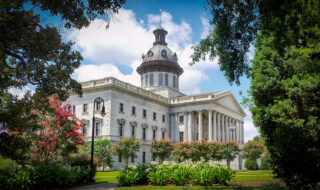April 23, 2021 Last Edit: June 5, 2025
Oregon House Passes Unemployment Insurance Tax Relief
State Director Anthony Smith reports from Salem on the small-business agenda for the legislative and political week ending April 23
It’s Day 95 of the 160-day Oregon Legislative Session and just as the pace started to quicken in the House, the chamber experienced another case of COVID-19, causing all floor sessions to be canceled until Monday, April 26 – and perhaps longer if additional positive cases pop up.
Democrats and Republicans in the House had just recently reached a deal to end the reading of bills in their entirety upon final passage before the virus struck again. Republicans agreed to suspend the rules to wave the constitutional reading requirement in exchange for an equal seat at the table on redistricting – the process for drawing new legislative district maps that the state will use in elections for the next decade. The House Special Committee on Redistricting now has an equal number of Democrats and Republicans (three each) and Rep. Shelly Boshart Davis (R-Albany) was promoted to co-chair – a job she shares with Rep. Andrea Salinas (D-Lake Oswego).
With a deal in place, the House moved quickly to pass a sizable backlog of bills that had been piling up on third reading calendar. In total, more than 70 bills passed in three days – and luckily, House Bill 3389, the Unemployment Insurance Tax Relief bill, supported by NFIB, was one of them. The bill passed unanimously and is now assigned to the Senate Committee on Labor and Business.
Here are the quick highlights of what’s been going on, and what’s coming up, with more information below on each topic:
- NFIB’s Oregon Virtual Small Business Day: NFIB members from across the state gathered virtually on Tuesday, April 20 to learn about the top small business issues being debated in this year’s legislative session – and to urge legislators to pass HB 3389!
- Unemployment Insurance Tax Relief Awaiting Action in the Senate: HB 3389 passed unanimously in the House on Thursday, April 15. It has been referred to the Senate Committee on Labor and Business. Hopefully, the bill will be scheduled for a public hearing very soon!
- The Storm Before the Calm: The fourth surge of COVID-19 has officially hit Oregon, causing case counts, test positivity rates, and hospitalizations to rise significantly in recent days, even among younger and healthier people. Gov. Kate Brown held a press conference earlier today, and while she’s optimistic that this surge will end within the next few weeks, it may also trigger a temporary return to the Extreme Risk category for many counties.
NFIB’s Oregon Virtual Small Business Day
Thank you to everyone who attended our annual Small Business Day event! Although this year looked different than prior years, one advantage of the virtual format was that we had a few more attendees than normal – and from more diverse parts of the state.
During the program, we were lucky to hear from Sen. Lynn Findley (R-Vale) and Rep. E. Werner Reschke (R-Klamath Falls). Both legislators shared with us, from an insider’s perspective, their general impressions of the 2021 legislative session, including the potential impacts of numerous pieces of legislation on Oregon’s small businesses. You can read some of their comments here.
The big disadvantage of the video conferencing format was that we weren’t able to make group visits to lawmakers’ offices to speak with them about our priority issues, which is why we deployed an Action Alert immediately following the event to urge NFIB members to contact their state senators, asking them to support House Bill 3389 – the Unemployment Insurance Tax Relief bill.
Unemployment Insurance Tax Relief Awaiting Action in the Senate
The day after House Democrats and Republicans reached a deal to stop the reading of bills, HB 3389 passed unanimously during an evening House floor session. The bill will provide $2.4 Billion in UI tax relief to Oregon employers over the next decade by providing short- and long-term solutions to what would otherwise be an automatic payroll tax increase to replenish the state’s UI trust fund. See attached for more information about HB 3389.
Since then, the bill has been referred to the Senate Committee on Labor and Business, which is a great committee for this bill to be assigned to because both the Chair, Sen. Chuck Riley (D-Hillsboro) and the Vice-Chair, Sen. Bill Hansell (R-Athena), are chief sponsors of the bill – and were both part of the workgroup that developed the legislation.
NFIB will testify in support of HB 3389 when it is scheduled for a public hearing, and hopefully, the bill will move quickly to the Senate floor for a final vote. After that, the bill will be sent to the desk of Gov. Kate Brown for her signature, and the bill will become law on the 91st day following adjournment sine die.
Even though this bill looks like it has the momentum to pass in the Senate, we aren’t taking any chances. If you haven’t done so already, please consider taking action now and asking your state senator to prioritize the passage of HB 3389 right away. If you’ve already taken action on this issue, thank you!
The Storm Before the Calm
Gov. Kate Brown held a press conference earlier today. Her comments were a mixed bag of good and bad news.
First, the bad news. The fourth surge of COVID-19 has officially hit Oregon, causing case counts, test positivity rates, and hospitalizations to rise significantly in recent days, even among younger and healthier people. The governor gave notice that her “warning week” policy is ending and that the next three weeks are going to be critical to keeping the virus under control.
She will be making an announcement early next week as to whether many counties that are currently in the High Risk category will be moved to Extreme Risk, which means temporary business closures for certain industry sectors starting Friday, April 30. If this happens, public health officials expect the closures to be for a much shorter period of time than prior shutdowns based on the fact that Oregon is very close to achieving a level of vaccination state-wide that should make it much more difficult for the virus to spread.
Which leads us to the good news. If all goes right, the current modeling shows that the County Risk Level system will no longer be needed by the end of June. Masks and social distancing will likely still be required, but business closures/restrictions will end. This is the news that so many have been waiting to hear, albeit soured by the very real possibility of another round of harsh restrictions before we get there.
This is the first time I’ve heard the governor and public health officials propose a defined timeframe for ending the pandemic’s business restrictions, and I have to believe that their confidence level is fairly high. It would be very difficult to walk back from this if they aren’t able to make good on the proposed timeline.
Previous Reports and Related News
NFIB is a member-driven organization advocating on behalf of small and independent businesses nationwide.
Related Articles















